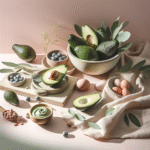In the realm of weight management, zero-calorie foods have gained popularity as a potential ally in creating calorie deficits. While the term “zero-calorie” is technically inaccurate, it refers to foods that are so low in calories that the energy expended during digestion may offset their calorie content. These foods are predominantly plant-based, rich in water and fiber, and they offer a range of health benefits beyond their low caloric value.
Exploring the Misnomer
The notion of zero-calorie foods can be misleading because no food is entirely devoid of calories. Instead, these foods are extremely low in caloric value. The energy your body uses to digest these foods, known as the thermic effect of food (TEF), can sometimes exceed the energy provided by the food itself. This effect is more pronounced in foods that are high in fiber and water content, such as fruits and vegetables.
Role in Weight Management
Incorporating zero-calorie foods into your diet can aid in weight management by helping to create a calorie deficit. While they are not miracle weight loss solutions, they can serve as effective tools in a balanced diet. These foods are often low in fat and sugar, making them ideal for reducing overall calorie intake without sacrificing volume or nutrition.
Celery: The Classic Example
Celery is often cited as the quintessential zero-calorie food due to its high water content and low calorie count. It is composed of about 95% water, which contributes to its low energy density.
Benefits Beyond Calorie Count
Celery is not only low in calories but also rich in essential nutrients like vitamin K, folate, and potassium. These nutrients play crucial roles in bone health, blood clotting, and maintaining fluid balance in the body. Additionally, celery contains antioxidants such as flavonoids and vitamin C, which help combat oxidative stress and inflammation.

Versatile Uses
Celery’s crunchy texture makes it a versatile ingredient in various dishes. It can be eaten raw as a snack, providing a satisfying crunch while delivering minimal calories. Additionally, celery can be added to soups, stews, and salads, enhancing flavor and texture. For a nutritious snack, pair celery sticks with a source of protein, such as hummus or peanut butter, to increase satiety and nutritional value.
Cucumber: Hydration and Nutrition
Cucumbers are another excellent example of low-calorie foods, boasting a high water content and a refreshing taste. They are composed of about 96% water, making them a hydrating option, especially in hot weather.
Nutrient Profile and Health Benefits
Beyond their hydrating properties, cucumbers offer a modest amount of vitamin K, which is essential for bone health and blood clotting. They also contain antioxidants like beta-carotene and flavonoids, which help protect against cellular damage. The presence of cucurbitacins, natural compounds with anti-inflammatory properties, further enhances cucumbers’ health benefits.
Cucumbers can be enjoyed in a variety of ways, from simple slices in salads to more creative uses like cucumber smoothies or infused water. Their mild flavor makes them an excellent base for salads, and their crispness provides a delightful contrast to other ingredients. For a refreshing drink, blend cucumber with lime and mint, creating a hydrating beverage that is perfect for summer days.
Lettuce, particularly varieties like iceberg and romaine, is a dietary staple due to its low calorie content and versatility in culinary applications. It is primarily composed of water, which contributes to its low energy density.
Vitamin Enriched
While lettuce is low in calories, it provides important nutrients such as vitamin A, vitamin C, and iron. Vitamin A is crucial for maintaining healthy vision and immune function, while vitamin C acts as an antioxidant and supports skin health. Iron is essential for oxygen transport in the blood, and its presence in lettuce helps contribute to overall nutrient intake.

Smart Food Swaps: Lettuce, Watermelon, Broccoli & Cauliflower
Lettuce is more than just salad filler. Its crisp texture and low calories make it a smart swap for sandwich bread, taco shells, or even wraps. Try using large lettuce leaves as a base for grilled meats or as a refreshing low-carb taco alternative.
Watermelon is a summer staple that’s both sweet and hydrating. Despite its sugary taste, it’s low in calories and rich in vitamins A and C. Thanks to its high water content and lycopene—a powerful antioxidant—it supports hydration, skin health, and may even help reduce the risk of heart disease. Enjoy it chilled, in salads with mint and feta, or blended into smoothies or popsicles.
Broccoli packs a nutritional punch with vitamins C and K, fiber, and antioxidants like sulforaphane. These nutrients support digestion, immunity, and may help protect against certain cancers. It’s easy to enjoy—steam, roast, or stir-fry it with olive oil and garlic. Sprinkle with parmesan for a simple, satisfying side.
Cauliflower is a low-carb hero. It’s high in fiber, vitamin C, and folate, while also offering cancer-fighting glucosinolates. Its mild flavor makes it a great base for swaps like cauliflower rice, mash, pizza crust, or even healthier mac and cheese. It’s the perfect way to lighten up comfort foods without losing satisfaction.
Berries: Nutrient-Rich and Flavorful
Berries, including strawberries, blueberries, and raspberries, are not only low in calories but also packed with essential nutrients and antioxidants. Their vibrant colors and sweet flavors make them a popular choice for healthy snacks and desserts.
Berries are rich in antioxidants, such as anthocyanins and vitamin C, which help protect against oxidative stress and inflammation. These compounds have been linked to numerous health benefits, including improved heart health and reduced risk of chronic diseases. Berries also provide fiber, which supports digestive health and promotes satiety.
Berries can be enjoyed in a variety of ways, from eating them fresh as a snack to incorporating them into smoothies, yogurt, or oatmeal. They add natural sweetness and vibrant color to dishes, making them a versatile ingredient in both sweet and savory recipes. For a simple dessert, try topping a bowl of berries with a dollop of whipped cream or a sprinkle of granola for added texture and flavor.
Zucchini: Low-Calorie Versatility
Zucchini is a water-rich vegetable that offers a range of culinary possibilities while remaining low in calories. Its mild flavor and tender texture make it a versatile addition to numerous dishes.
Zucchini provides essential nutrients such as vitamin C, manganese, and fiber. These nutrients support immune function, bone health, and digestion. Additionally, zucchini contains carotenoids such as lutein and zeaxanthin, which are important for eye health and may help reduce the risk of age-related macular degeneration.
Zucchini can be used in a variety of ways, from spiralizing it into noodles (zoodles) as a low-carb alternative to pasta, to grilling or roasting it as a side dish. For a nutritious and flavorful meal, try stuffing zucchini with lean proteins and vegetables or incorporating it into baked goods like zucchini bread for added moisture and nutrition.
Bell Peppers: Colorful and Nutritious
Bell peppers, especially the green variety, are low in calories and high in nutritional value, making them a valuable addition to any diet. Their vibrant colors and crisp texture add visual appeal and flavor to a wide range of dishes.
Bell peppers are packed with vitamins A and C, both of which are important for maintaining healthy skin and supporting immune function. They also provide potassium, which is essential for maintaining healthy blood pressure levels. The presence of carotenoids such as beta-carotene and lutein further enhances bell peppers’ health benefits.
Bell peppers can be enjoyed raw as a crunchy snack, sliced into salads, or roasted for a sweeter flavor. They can also be stuffed with a variety of fillings, such as quinoa, beans, and lean proteins, for a nutritious and satisfying meal. For a colorful and flavorful side dish, try grilling or sautéing bell peppers with onions and garlic, adding depth and richness to their natural sweetness.
Tomatoes: Nutrient-Dense Fruit
While technically a fruit, tomatoes are often used as vegetables in culinary contexts. They are rich in essential nutrients and antioxidants, making them a valuable addition to any diet.
Tomatoes are high in vitamin C, potassium, and lycopene, an antioxidant with potential health benefits, including reduced risk of heart disease and certain cancers. Their high water content and low calorie count make them an excellent choice for those seeking to manage their weight while maintaining nutritional quality.
Tomatoes can be used in a variety of dishes, from fresh salads and salsas to cooked sauces and soups. Their natural sweetness and acidity enhance the flavors of both savory and sweet recipes. For a simple and nutritious meal, try making a classic Caprese salad with tomatoes, mozzarella, and basil, drizzled with balsamic glaze.
Integrating Zero-Calorie Foods into Your Diet
Incorporating zero-calorie foods into your diet can be both enjoyable and beneficial for weight management. Here are some tips for making the most of these nutrient-rich, low-calorie options:
- Start with a Salad: Begin your meals with a salad or a soup made with zero-calorie foods to help fill you up before moving on to higher-calorie dishes.
- Snack Smartly: Choose zero-calorie foods as snacks between meals to maintain satiety and avoid reaching for high-calorie options.
- Bulk Up Dishes: Use zero-calorie foods to add volume to meals without significantly increasing the calorie content. For example, add zucchini spirals to pasta dishes, or blend cauliflower into creamy soups for added texture and nutrition.
- Stay Hydrated: Drink plenty of water throughout the day, as hydration is essential for optimal digestion and metabolism.

Common Questions About Zero-Calorie Foods
Are they truly calorie-free?
No, these foods are not completely calorie-free. They are very low in calories, and the energy expended during digestion may offset their calorie content, contributing to a calorie deficit.
Can they replace other foods in my diet?
While zero-calorie foods can help reduce overall calorie intake, they should be part of a balanced diet that provides adequate nutrients from proteins, fats, and carbohydrates.
Do they boost metabolism?
These foods can contribute to a calorie deficit, but they don’t directly boost metabolism. A balanced diet and regular exercise are key to maintaining a healthy metabolism.
Tips for Success with Zero-Calorie Foods
- Mindful Eating: Practice mindful eating by paying attention to hunger cues and eating slowly to enjoy these foods and feel satisfied.
- Experiment with Recipes: Explore new recipes that incorporate zero-calorie foods to keep meals interesting and flavorful.
- Variety is Key: Ensure a balanced diet by including a variety of foods from different food groups to meet all nutritional needs.
By incorporating these zero-calorie foods into your diet, you can enjoy satisfying meals that support your weight loss goals without compromising on nutritional quality. Remember, the key to success lies in variety, balance, and a mindful approach to eating.
Ready to Transform Your Health?
🥑 Download our FREE Complete Keto Diet Plan and start your journey to better health today!
[convertkit form=7803861]
—
Disclaimer: This content is for informational purposes only and does not constitute medical advice. Always consult a qualified healthcare professional before making changes to your health regimen.






